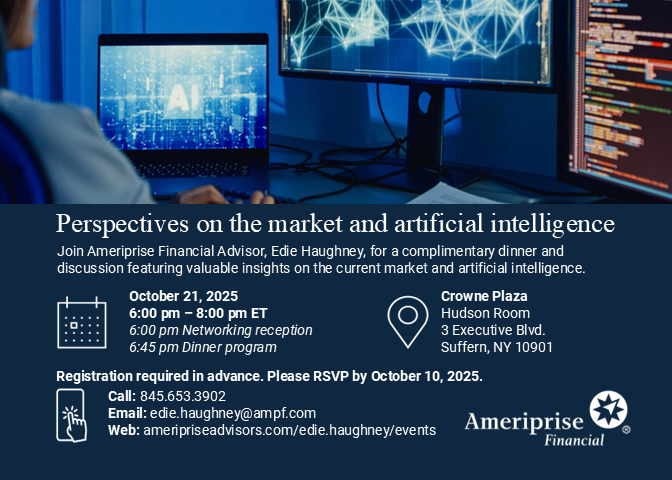AI Insights
You.com Valued at $1.5 Billion Amid Shift From AI Search

Artificial intelligence (AI) startup You.com has reportedly raised $100 million in new funding.
AI Insights
Artificial Intelligence event Oct 21st in Suffern – Rockland News

Suffern, NY – Edie Haughney, Ameriprise Financial Advisor, will be hosting a complimentary dinner and discussion on the current market and artificial intelligence on Tuesday, October 21st at the Crowne Plaza in Suffern.
The program will be begin at 6pm and advanced registration is required by October 10th.
AI Insights
Melania Trump hosts AI meeting with Google CEO, tech leaders

WASHINGTON — First lady Melania Trump declared “the robots are here” as she urged a deliberate but careful embrace of artificial intelligence during a convening Thursday of a White House task force on AI in education.
“I predict AI will represent the single largest growth category in our nation during this administration, and I won’t be surprised if AI becomes known as the greatest engine of progress in the history of the United States of America,” Trump said. “But, as leaders and parents, we must manage AI’s growth responsibly.”
The first lady was joined on stage for the roundtable-style event by members of the task force, which includes several of President Donald Trump’s Cabinet secretaries, as well as major names in the technology sector, such as Google CEO Sundar Pichai. Dozens of other Big Tech and private sector leaders, including OpenAI CEO Sam Altman, were present in the East Room for the event, where they were lauded by White House Office of Science and Technology Policy Director Michael Kratsios for their “generous pledges.”
The meeting was meant to shine a light on what the White House says is more than 135 commitments from leaders in the field to support education in artificial intelligence across the country.
Arvind Krishna, the CEO of IBM, for instance, noted in his remarks to the room that the technology company he leads is signing on to train 2 million American workers in “cutting-edge AI skills” over the next three years through a newly launched program.
Pichai, meanwhile, announced that of the $1 billion the company recently committed for education and job training programs, $150 million would specifically go toward AI-focused grants.
“This is all in the service of helping the next generation to solve problems, fuel innovation and build an incredible future,” he said. “These are all goals we all share. We are incredibly thankful for the partnership and the leadership from the first lady, the president and the administration and for showing us the way.”
It was the second meeting of the task force since the president created it via an executive order in April meant to boost AI literacy and proficiency in America by better incorporating it into education. The event marked the first since the Melania Trump announced a nationwide competition challenging students in grades K-12 to use artificial intelligence to address a community issue, which will conclude with an event at the White House with the winners.
“We must ensure America’s talent, our workforce, is prepared to sustain AI’s progress, and the Presidential AI Challenge is our first major step to galvanize America’s parents, educators, and students with this mission,” the first lady said at the task force meeting.
She added that AI will “serve as the underpinning of every business sector in our nation.”
Several of the president’s Cabinet secretaries who sit on the task force, including Education Secretary Linda McMahon, Agriculture Secretary Brooke Rollins and Energy Secretary Chris Wright, gave updates on how they are utilizing the technology in their work and seeking to ensure Americans are educated in how to use it in the fields related to their departments.
McMahon, for instance, pointed to a recent letter to those receiving grants from the Education Department letting them know that AI tools and technologies are an “allowable use” of federal funds in a bid, she said, to empower schools to explore how to best integrate the technology in teaching. Wright used his remarks to warn that the U.S. “will not win at AI if we don’t massively grow our electricity production.”
The president’s AI and crypto czar David Sacks, meanwhile, highlighted Trump’s other executive orders related to AI, including one seeking to make it easier to build new data centers and energy infrastructure.
“Some people think that AI is going to take all of our jobs,” Sacks said. “I really don’t think that’s going to happen.”
Instead, he argued AI would unleash a “boom like we’ve never seen.”
The first lady, who has not frequently taken the spotlight and participated in selective events since her husband’s return to the Oval Office, has touched what she sees as both the positives and negatives of the rapidly developing technology. The White House has highlighted how she utilized AI for the narration of the audio version of her 2024 memoir “Melania.” At the same time, the first lady actively supported and pushed for a bill — ultimately passed by Congress and signed by the president — imposing harsher penalties for the spread of non-consensual sexual images, including those created using artificial intelligence.
AI Insights
Can artificial intelligence start a nuclear war?

Stanford University simulations have shown that current artificial intelligence models are prone to escalating conflicts to the point of nuclear weapons. The study raises serious questions about the risks of automating military decisions and the role of AI in future wars.
This is reported by Politico .
The results of war games conducted by researcher Jacqueline Schneider from Stanford indicate that artificial intelligence could become a dangerous factor in modern wars if it gains influence over military decision-making.
According to the scientist, during simulations, the latest AI models consistently chose aggressive escalation scenarios, including the use of nuclear weapons. Schneider compared the behavior of the algorithms to the approach of Cold War general Curtis LeMay, who was known for his willingness to use nuclear force on minimal pretext.
“Artificial intelligence models understand perfectly well how to escalate a conflict, but are actually unable to offer options for its de-escalation,” the researcher explained.
In her opinion, this is due to the fact that most of the military literature used to train AI describes escalation scenarios, not those that avoided war.
The Pentagon assures that AI will not have the right to make decisions about launching nuclear missiles, and emphasizes the preservation of “human control.” At the same time, modern warfare is increasingly dependent on automated systems. Already today, projects like Project Maven rely entirely on machine-generated intelligence data, and in the future, algorithms will even be able to advise on countermeasures.
In addition, there are already examples of automation in the field of nuclear weapons in the world. Russia has the Perimeter system, capable of delivering a strike without human intervention, and China is investing huge resources in the development of military artificial intelligence.
Journalists also recall the case of 1979, when US President Jimmy Carter’s advisor Zbigniew Brzezinski received a message about the alleged launch of 200 Soviet missiles. Only a moment before the decision to retaliate was made, it turned out that this was a system error. The question is whether artificial intelligence, which works “reflexively”, would have been able to wait for more detailed information, or would have pressed the “red button” automatically.
Thus, the discussion about the role of AI in the military sphere is becoming increasingly relevant, because not only the outcome of the battle, but also the fate of all humanity may be at stake.
It was previously reported that the Thwaites Glacier in Antarctica, nicknamed the “Doomsday Glacier,” is losing stability and could trigger a rapid rise in sea levels by several meters.
Recall that Hollywood actor and musician Will Smith was involved in a scandal. In particular, the star of “Men in Black” was suspected of using artificial intelligence.
Also follow “Pryamim” on Facebook , Twitter , Telegram , and Instagram.
-

 Business6 days ago
Business6 days agoThe Guardian view on Trump and the Fed: independence is no substitute for accountability | Editorial
-
Tools & Platforms3 weeks ago
Building Trust in Military AI Starts with Opening the Black Box – War on the Rocks
-

 Ethics & Policy1 month ago
Ethics & Policy1 month agoSDAIA Supports Saudi Arabia’s Leadership in Shaping Global AI Ethics, Policy, and Research – وكالة الأنباء السعودية
-

 Events & Conferences4 months ago
Events & Conferences4 months agoJourney to 1000 models: Scaling Instagram’s recommendation system
-

 Jobs & Careers2 months ago
Jobs & Careers2 months agoMumbai-based Perplexity Alternative Has 60k+ Users Without Funding
-

 Education2 months ago
Education2 months agoVEX Robotics launches AI-powered classroom robotics system
-

 Funding & Business2 months ago
Funding & Business2 months agoKayak and Expedia race to build AI travel agents that turn social posts into itineraries
-

 Podcasts & Talks2 months ago
Podcasts & Talks2 months agoHappy 4th of July! 🎆 Made with Veo 3 in Gemini
-

 Podcasts & Talks2 months ago
Podcasts & Talks2 months agoOpenAI 🤝 @teamganassi
-

 Education2 months ago
Education2 months agoMacron says UK and France have duty to tackle illegal migration ‘with humanity, solidarity and firmness’ – UK politics live | Politics





















